1995 年 1 月英语四级真题及答案
Part I Listening Comprehension (20 minutes)
Section A
1.
A) Go out to work.
B) Listen carefully to John.
C) Be calm and patient.
D) Do the easiest thing.
2.
A) He doesn’t like to talk.
B) He is a very kind man.
C) He is friendly.
D) He is not a pleasant person.
3.
A) The doctor won’t see her tomorrow.
B) The doctor is busy tomorrow.
C) The doctor is busy all day today.
D) The doctor will see her today.
4.
A) Young people are too quick in making decisions.
B) Young people seldom stay long on the same job.
C) Young people lose their jobs easily.
D) Young people are too eager to succeed.
5.
A) She felt it was tiring.
B) She felt it was very nice.
C) She thought it took less time.
D) She thought it was expensive.
6.
A) They are having breakfast.
B) They are eating some fruit.
C) They are preparing a hot soup.
D) They are drinking cold milk.
7.
A) The woman doesn’t want to spend Christmas with the man.
B) The woman is going home for Christmas party.
�
C) The woman has not been invited to the Christmas party.
D) The woman is going to spend Christmas abroad.
8.
A) By car.
B) By bus.
C) By place.
D) By train.
9.
A) It closes at four on weekdays.
B) He doesn’t know its business hours.
C) It isn’t open on Sundays.
D) It is open till four on Sundays.
10. A) Tennis shoes.
B) Some clothes.
C) Nothing yet.
D) Music records.
Section B
Questions 11 to 13 are based on the passage you have just heard.
Passage One
11. A) In about 20 years.
B) Within a week.
C) In a couple of weeks.
D) As early as possible.
12. A) Yes, of course.
B) Possibly not.
C) Not mentioned.
D) Definitely not.
13. A) Her complaint was ignored.
B) The store sent her the correct order.
C) The store apologized for their mistake.
D) The store picked up the wrong items.
Passage Two
�
Questions 14 to 17 are based on the passage you have just heard.
14. A) The prison gates always open.
B) Its prisoner can work outside.
C) The prison has no armed guards.
D) The prison is open to the public.
15. A) The prisoners are provided with jobs on release.
B) Its prisoners are seldom made to work overtime.
C) It is run on the principle of trusting prisoners.
D) It has no security measures.
16. A) One year.
B) Two years.
C) Thirteen years.
D) Fourteen years.
17. A) Doubtful.
B) Positive.
C) Critical.
D) Indifferent.
Questions 18 to 20 are based on the passage you have just heard.
Passage Three
18. A) It’s good for training one’s character but not good for one’s health.
B) It cannot prepare pupils to be good citizens.
C) It has less effect on a child’s character than sports and games.
D) It’s as important as after-class activities.
19. A) Because pupils there have to spend most of the time studying.
B) Because the school authorities insist on traditional ways of teaching.
C) Because the school authorities have neglected discipline.
D) Because pupils there are too fond of playing.
20. A) Practical work.
B) Collective activities.
C) Teacher’s encouragement.
�
D) Book knowledge.
Part II Reading Comprehension (35 minutes)
Passage One
Questions 21 to 25 are based on the following passage.
People tend to be more impressed by evidence that seems to confirm some relationship.
Thus many are convinced their dreams are prophetic (预言的) because a few have come
true; they fail to notice the many that have not. Consider also the belief that “the
phone always rings when I’m in the shower.” If it does ring while you are in the shower,
the event will stand out and be remembered. If it doesn’t ring, that nonevent probably
won’t even register (留下印象).
People want to see order, pattern and meaning in the world. Consider, for example,
the common belief that things like personal misfortunes, plane crashes, and deaths
“happen in threes.” Such beliefs stem from the tendency of people to allow the third
event to define the time period. If three plane crashes occur in a month, then the period
of time that counts as their “happening together” is one month; if three crashes occur
in a year, the period of time is stretched. Flexible end points reinforce such beliefs.
We also tend to believe what we want to believe. A majority of people think they
are more intelligent, more fair-minded and more skilled behind the wheel of an
automobile than the average person. Part of the reason we view ourselves so favorably
is that we use criteria that work to our advantage. As economist Thomas Schelling
explains, “Everybody ranks himself high in qualities he values: careful drivers give
weight to care, skilled drivers give weight to skill, and those who are polite give
weight to courtesy,” This way everyone ranks high on his own scale.
Perhaps the most important mental habit we can learn is to be cautious (谨慎的)
in drawing conclusions. The “evidence” of everyday life is sometimes misleading.
21. In the first paragraph the author states that ________.
A) dreams cannot be said to be prophetic even though a few have come true
B) dreams are prophetic because some of them did come true
C) dreams may come true if clearly remembered
D) dreams and reality are closely related
22. By “things like...” “happen in threes” (Para. 3, Line 2), the author indicates
that people believe ________.
A) personal misfortunes tend to happen every now and then
B) personal misfortunes, plane crashes, and deaths usually happen together
C) misfortunes tend to occur according to certain patterns
D) misfortunes will never occur more than three times to a person in his lifetime
�
23. Ten word “courtesy” (Para. 4, line 6) probably means ________.
A) good manners
B) appropriate speech
C) friendly relations
D) satisfactory service
24. What can be inferred from the passage? ________.
A) Happenings that go unnoticed deserve more attention.
B) In a series of misfortunes the third one is usually the most serious.
C) People tend to make use of evidence that supports their own beliefs.
D) Believers of misfortunes happening in threes are cautious in interpreting
events.
25. It can be concluded from the passage that ________.
A) there is some truth even in the wildest dreams
B) one should take notice of other people’s merits
C) there is no order or pattern in world events
D) we should not base our conclusions on accidental evidence
Passage Two
Questions 26 to 30 are based on the following passage.
It has been thought and said that Africans are born with musical talent. Because
music is so important in the lives of many Africans and because so much music is performed
in Africa, we are inclined to think that Africans are musicians. The impression is
strengthened when we look at ourselves and find that we have become largely a society
of musical spectators(旁观). Music is important to us, but most of us can be considered
consumers rather than producers of music. We have records, television, concerts, and
radio to fulfill many of our musical needs. In most situations where music is performed
in our culture it is not difficult to distinguish the audience from the performers,
but such is often not the case in Africa. Alban Ayipaga, a Kasena semiprofessional
musician from northern Ghana, says that when his flute (长笛) and drum ensemble (歌
舞团) is performing. “Anybody can take part”. This is true, but Kasena musicians
recognize that not all people are equally capable of taking part in the music. Some
can sing along with the drummers, but relatively few can drum and even fewer can play
the flute along with the ensemble. It is fairly common in Africa for there to be an
ensemble of expert musicians surrounded by others who join in by clapping, singing,
or somehow adding to the totality of musical sound. Performances often take place in
an open area (that is, not on a stage) and so the lines between the performing nucleus
and the additional performers, active spectators, and passive spectators may be
difficult to draw from our point of view.
�
26. The difference between us and Africans, as far as music is concerned, is that
________.
A) most of us are consumers while most of them are producers of music
B) we are musical performers and they are semiprofessional musicians
C) most of us are passive spectators while they are active spectators
D) we are the audience and they are the additional performers
27. The word “such” (Line 6) refers to the fact that ________.
A) music is performed with the participation of the audience
B) music is performed without the participation of the audience
C) people tend to distinguish the audience from the performers
D) people have records, television sets and radio to fulfill their musical needs
28. The author of the passage implies that ________.
A) all Africans are musical and therefore much music is performed in Africa
B) not all Africans are born with musical talent although music is important in
their lives
C) most Africans are capable of joining in the music by playing musical instruments
D) most Africans perform as well as professional musicians
29. The word “nucleus” (Line 13) probably refers to ________.
A) musicians famous in Africa
B) musicians at the center of attention
C) musicians acting as the core in a performance
D) active participants in a musical performance
30. The best title for this passage would be ________.
A) The Importance of Music to African People
B) Differences Between African Music and Music of Other Countries
C) The Relationship Between Musicians and Their Audience
D) A Characteristic Feature of African Musical Performances
Passage Three
Questions 31 to 35 are based on the following passage.
Most people would agree that, although our age exceeds all previous ages in
knowledge, there has been no corresponding increase in wisdom. But Agreement ceases
as soon as we attempt to define “wisdom” and consider means of promoting it.
There are several factors that contribute to wisdom. Of these I should put first
�
a sense of proportion: the capacity to take account of all the important factors in
a problem and to attach to each its due weight. This has become more difficult than
it used to be owing to the extent and complexity of the special knowledge required of
various kinds of technicians. Suppose, for example, that you are engaged in research
in scientific medicine. The work is difficult and is likely to absorb the whole of your
mind. You have no time to consider the effect which your discoveries or inventions may
have outside the field of medicine. You succeed (let us say) as modern medicine has
succeeded, in enormously lowering the infant death-rate, not only in Europe and America,
but also in Asia and Africa. This has the entirely unintended result of making the food
supply inadequate and lowing the standard of life in the parts of the world that have
the greatest populations. To take an even more dramatic example, which is in
everybody’s mind at the present time; you study the makeup of the atom from a
disinterested (无利害关系的) desire for knowledge, and by chance place in the hands
of a powerful mad man the means of destroying the human race.
Therefore, with every increase of knowledge and skill, wisdom becomes more
necessary, for every such increase augments (增强) our capacity for realizing our
purposes, and therefore augments our capacity for evil, if our purpose are unwise.
31. Disagreement arises when people try to decide ________.
A) how much more wisdom we have now than before
B) what wisdom is and how to develop it
C) if there is a great increase of wisdom in our age
D) whether wisdom can be developed or not
32. According to the author, “wisdom” is the ability to ________.
A) carefully consider the bad effects of any kind of research work
B) give each important problem some careful consideration
C) acquire a great deal of complex and special knowledge
D) give suitable consideration to all the possible elements in a problem
33. Lowering the infant death-rate may ________.
A) prove to be helpful everywhere in the world
B) give rise to an increase in population in Europe
C) cause food shortages in Asia and Africa
D) raise the living standard of the people in Africa
34. The author uses the examples in the passage to illustrate his point that ________.
A) it’s extremely difficult to consider all the important elements in problem
B) success in medical research has its negative effects
C) scientists may unknowingly cause destruction to the human race
�
D) it’s unwise to be totally absorbed in research in scientific medicine
35. What is the main idea of the passage?
A) It is unwise to place the results of scientific research in the hands of a
powerful mad man.
B) The more knowledge one has, the wiser one becomes.
C) Any increase of knowledge could lead to disastrous results without the guidance
of wisdom.
D) Wisdom increases in proportion to one’s age.
Passage Four
Questions 36 to 40 are based on the following passage.
For any given task in Britain there are more men than are needed. Strong unions
keep them there in Fleet Street, home of some London’s biggest dailies, it is understood
that when two unions quarrel over three jobs, the argument is settled by giving each
union two. That means 33 per cent overmanning, 33 per cent less productivity than could
be obtained.
A reporter who has visited plants throughout Europe has an impression that the pace
of work is much slower here. Nobody tries too hard. Tea breaks do matter and are frequent.
It is hard to measure intensity of work, but Britons give a distinct impression of going
at their tasks in a more leisurely way.
But is all this so terrible? It certainly does not improve the gross national product
or output per worker. Those observant visitors, however, have noticed something else
about Britain. It is a pleasant place.
Street crowds in Stockholm. Paris and New York move quickly and silently heads down,
all in a hurry. London crowds tend to walk at an easy pace (except in the profitable,
efficient City, the financial district).
Every stranger is struck by the patient and orderly way in which Britons queue for
a bus: if the saleswoman is slow and out of stock she will likely say, ‘oh dear, what
a pity’; the rubbish collectors stop to chat (聊天) and call the housewives “Luv.”
Crime rises here as in every city but there still remains a gentle tone and temper that
is unmatched in Berlin, Milan or Detroit.
In short, what is wrong with Britain may also be what is right. Having reached a
tolerable standard, Britons appear to be choosing leisure over goods.
36. What happens when disputes over job opportunities arise among British unions?
A) Thirty three per cent of the workers will be out of work.
B) More people will be employed than necessary.
C) More jobs will be created by the government.
D) The unions will try to increase productivity.
�
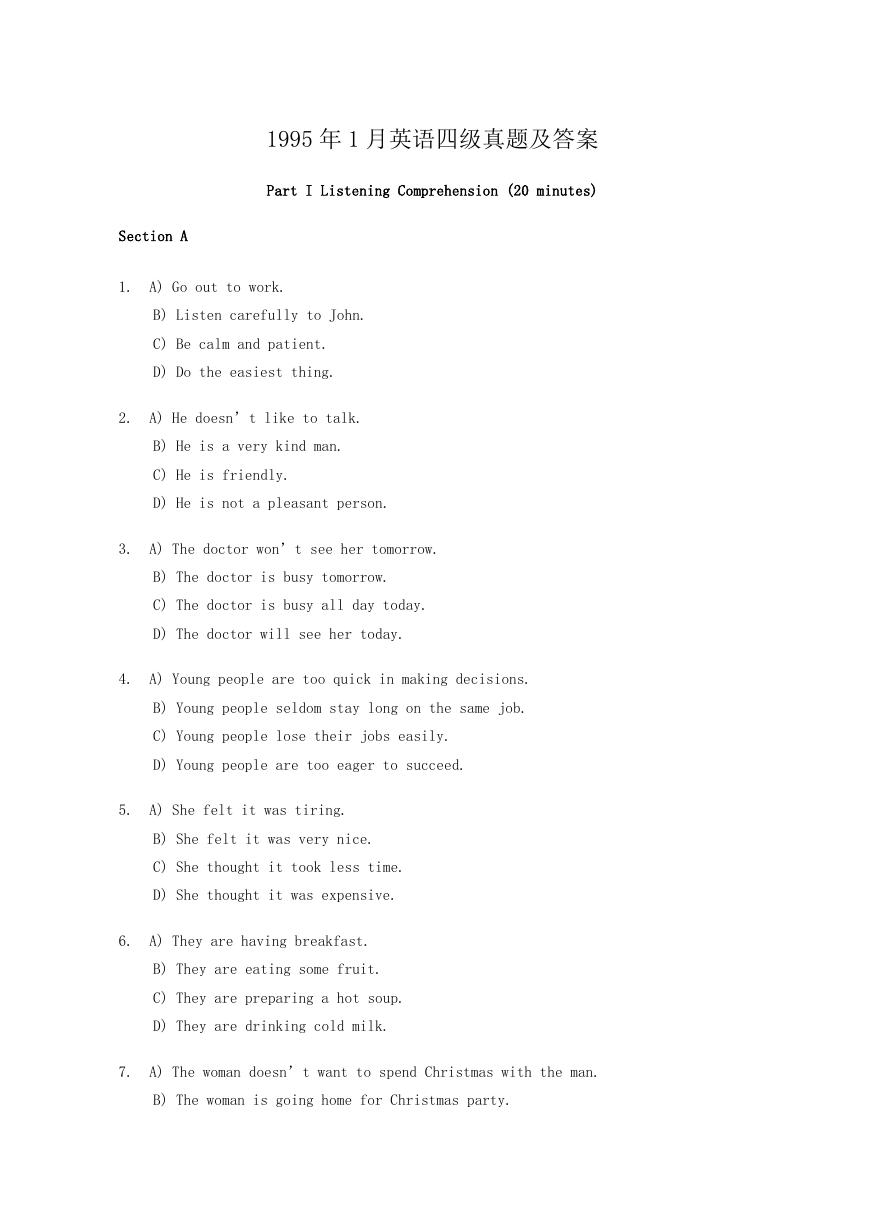
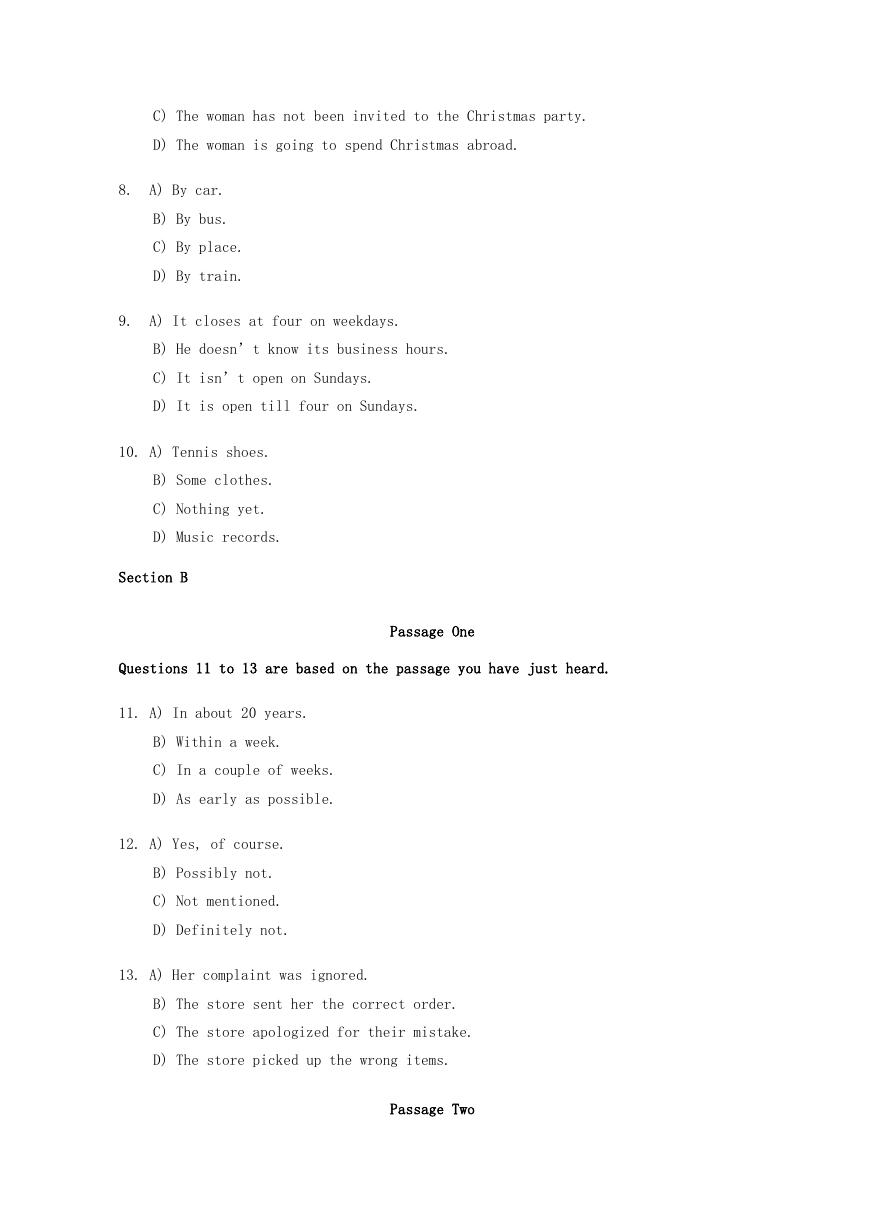
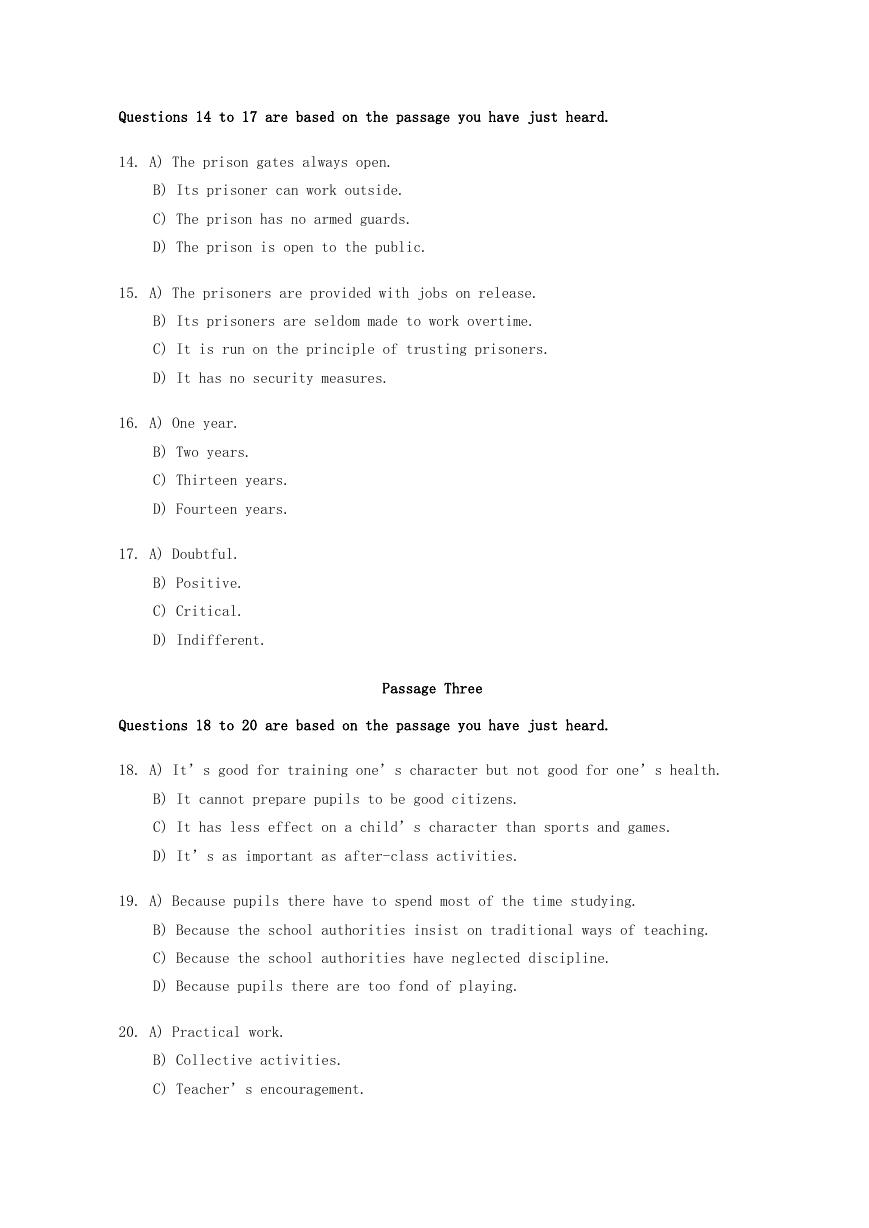
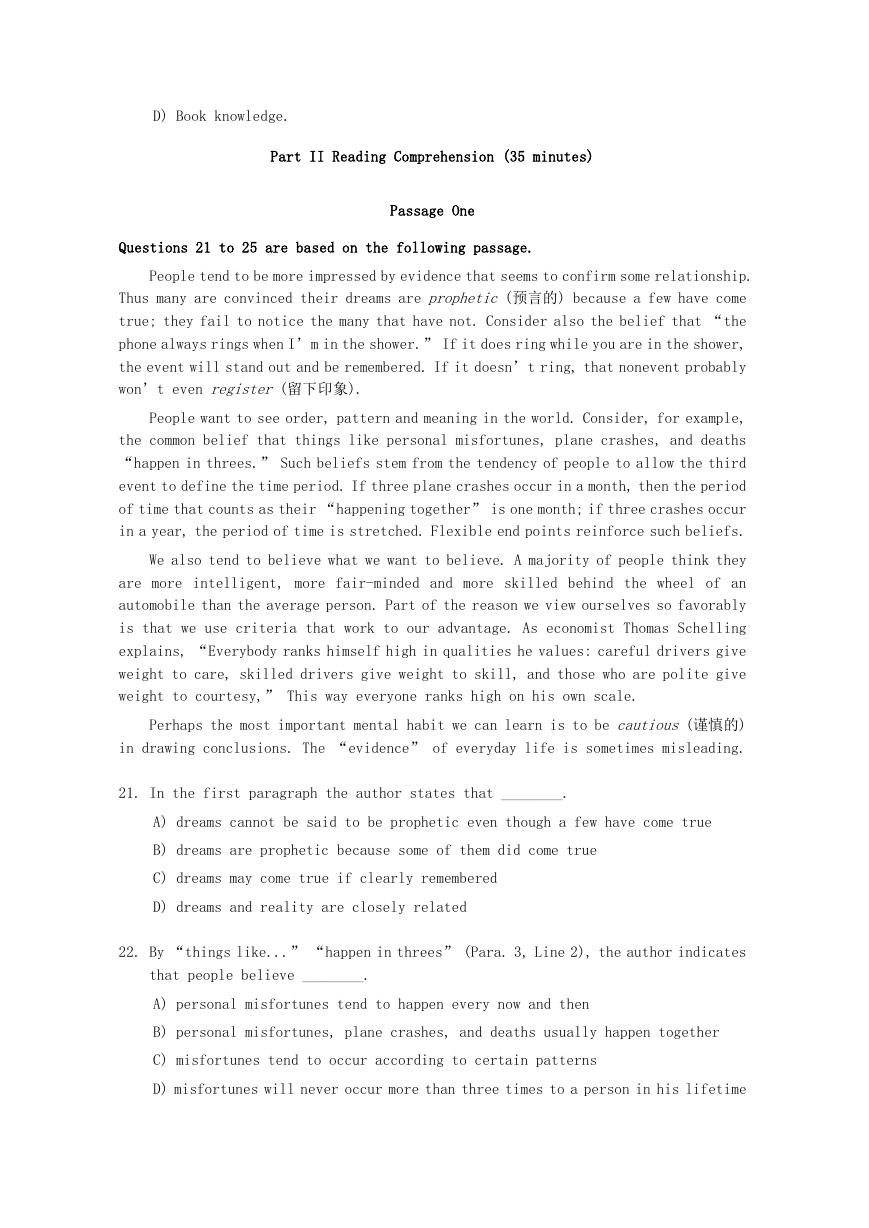
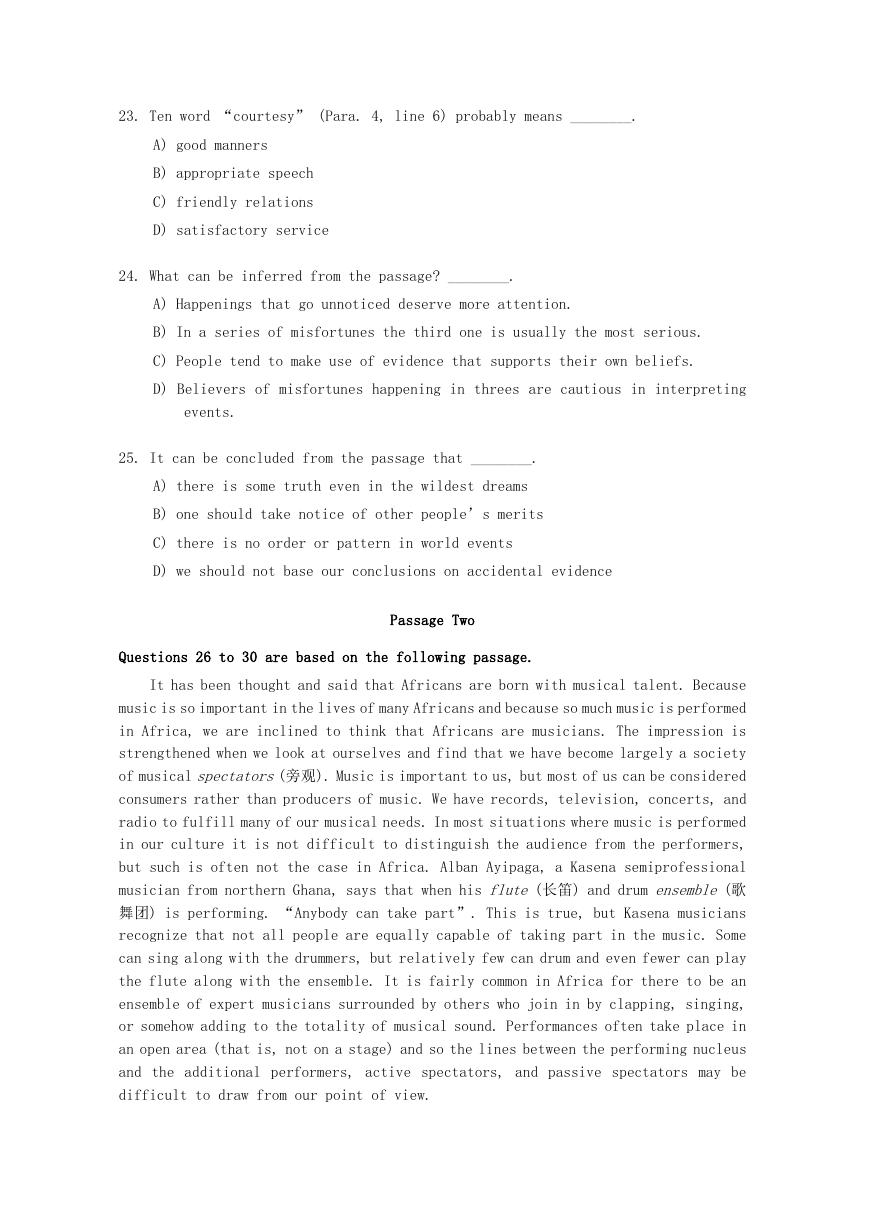
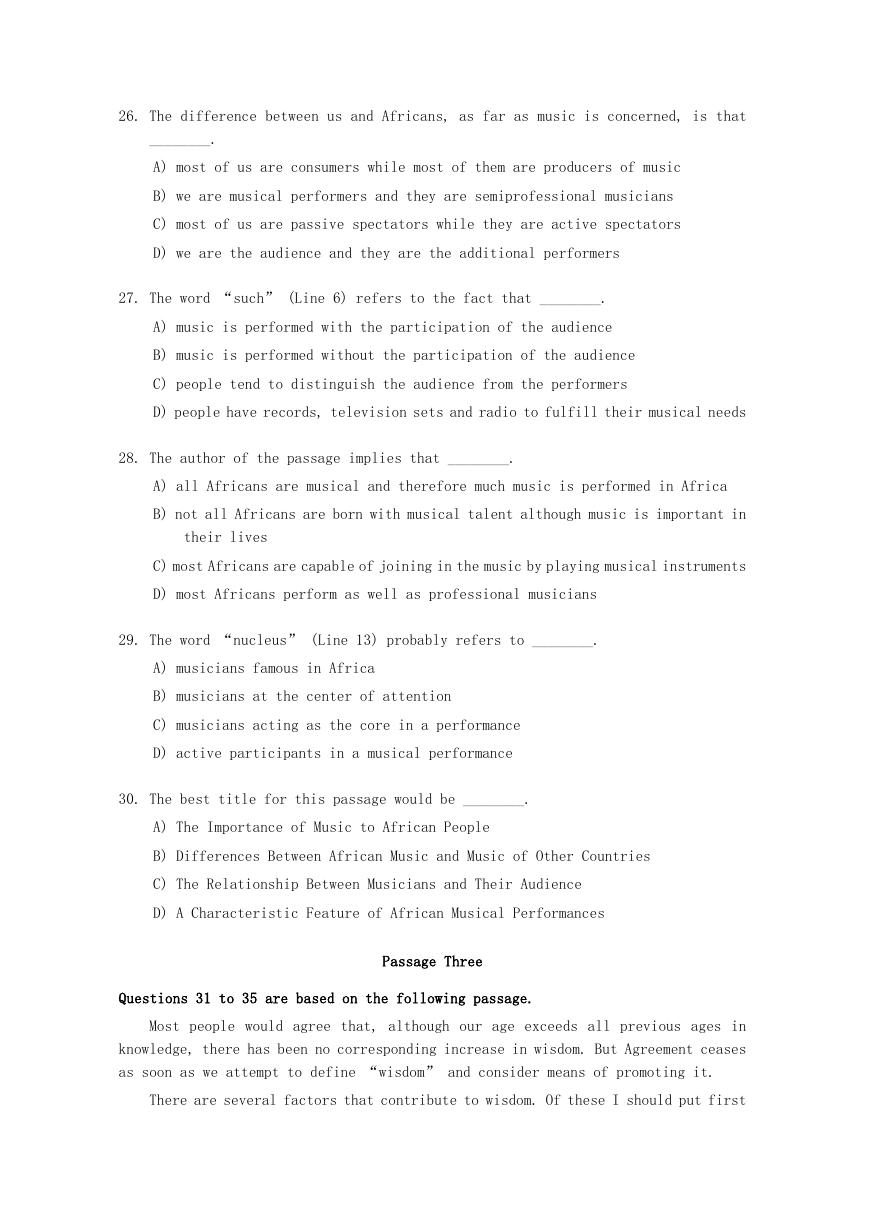
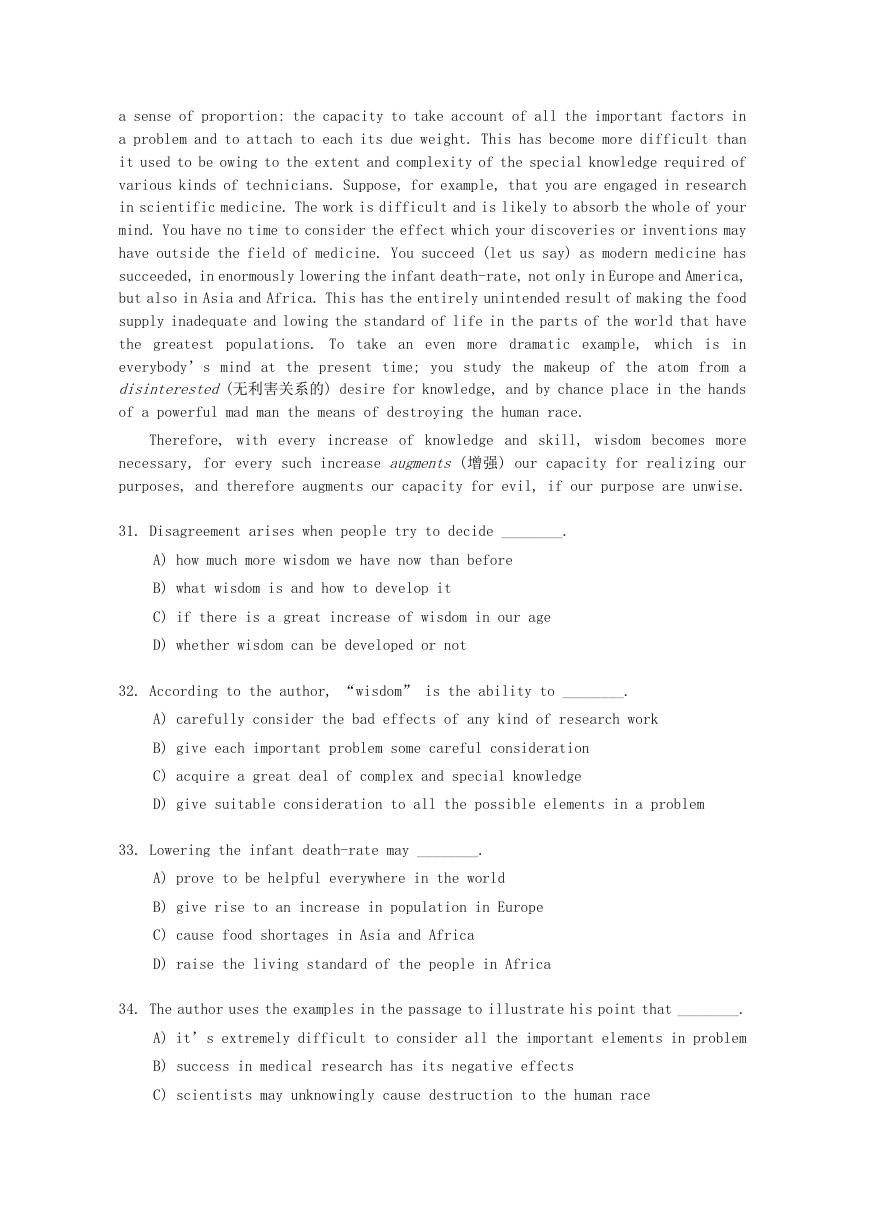
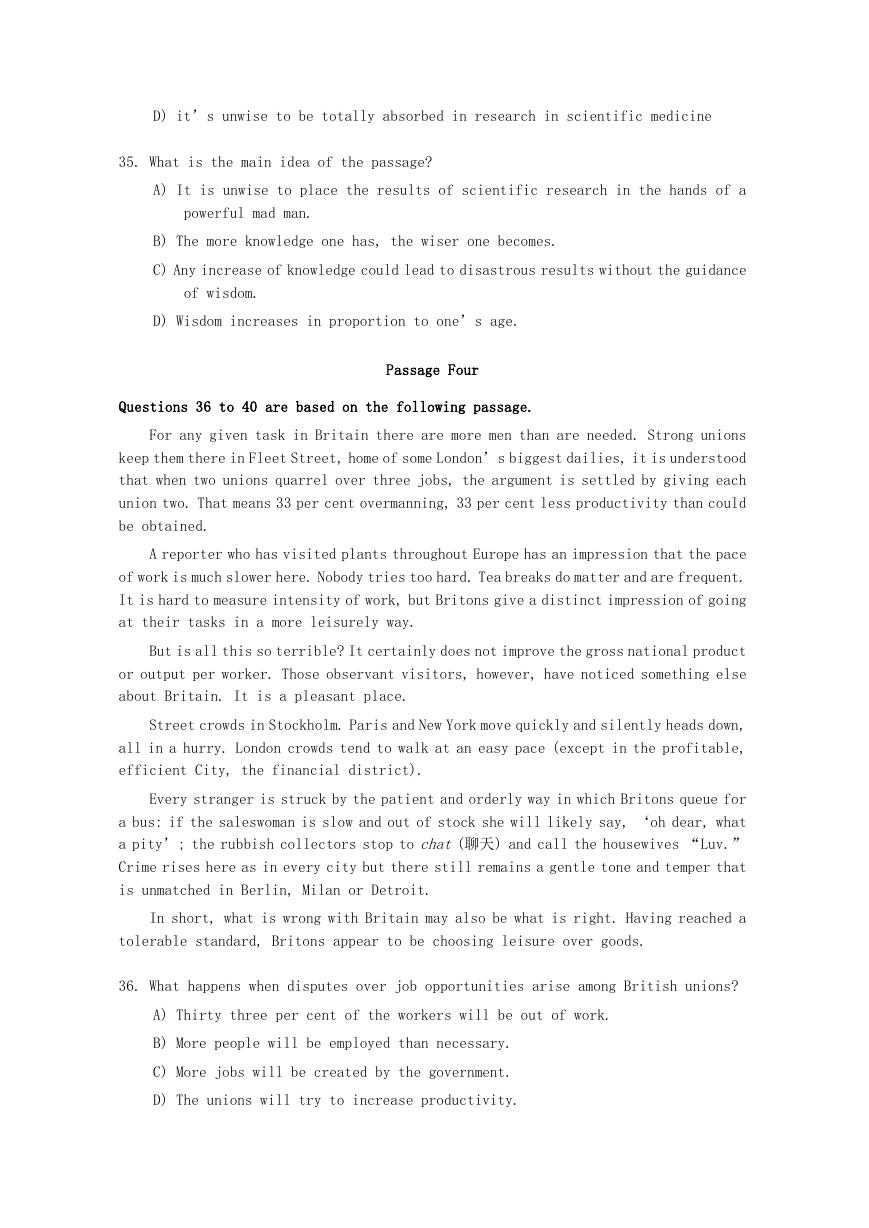








 2023年江西萍乡中考道德与法治真题及答案.doc
2023年江西萍乡中考道德与法治真题及答案.doc 2012年重庆南川中考生物真题及答案.doc
2012年重庆南川中考生物真题及答案.doc 2013年江西师范大学地理学综合及文艺理论基础考研真题.doc
2013年江西师范大学地理学综合及文艺理论基础考研真题.doc 2020年四川甘孜小升初语文真题及答案I卷.doc
2020年四川甘孜小升初语文真题及答案I卷.doc 2020年注册岩土工程师专业基础考试真题及答案.doc
2020年注册岩土工程师专业基础考试真题及答案.doc 2023-2024学年福建省厦门市九年级上学期数学月考试题及答案.doc
2023-2024学年福建省厦门市九年级上学期数学月考试题及答案.doc 2021-2022学年辽宁省沈阳市大东区九年级上学期语文期末试题及答案.doc
2021-2022学年辽宁省沈阳市大东区九年级上学期语文期末试题及答案.doc 2022-2023学年北京东城区初三第一学期物理期末试卷及答案.doc
2022-2023学年北京东城区初三第一学期物理期末试卷及答案.doc 2018上半年江西教师资格初中地理学科知识与教学能力真题及答案.doc
2018上半年江西教师资格初中地理学科知识与教学能力真题及答案.doc 2012年河北国家公务员申论考试真题及答案-省级.doc
2012年河北国家公务员申论考试真题及答案-省级.doc 2020-2021学年江苏省扬州市江都区邵樊片九年级上学期数学第一次质量检测试题及答案.doc
2020-2021学年江苏省扬州市江都区邵樊片九年级上学期数学第一次质量检测试题及答案.doc 2022下半年黑龙江教师资格证中学综合素质真题及答案.doc
2022下半年黑龙江教师资格证中学综合素质真题及答案.doc